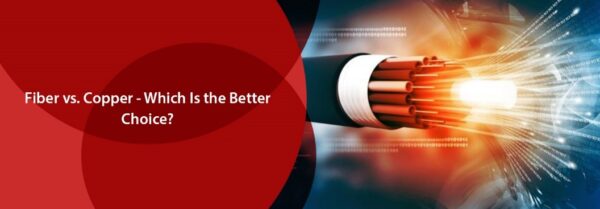Fiber or copper? It is a major concern for customers who are looking for a great internet connection. Both networks come with their pros and cons we are here to help you figure out which one will fit your need like a glove.
But before we dig in to find out which one is better for you, you must know the difference between them both.
Fiber Optic Connection
Fiber optic network contains optic cables that transfer data through light pulses by using photons that run in a cable made of plastic or glass. Now, plastic and glass don’t mean that it is fragile but the complete layered construction of this cable actually makes it more durable.
Fiber networks can transmit the internet at the speed of 1,000 Mbps and more. It is considered to be the most advanced and optimal internet service that is more capable in every aspect than any other network.
But the real question is that is it better for you? So let’s break it down and highlight some pros and cons of the network.
Pros of a Fiber Optic Internet Connection
· Greater Bandwidth
When it comes to bandwidth fiber internet is more advanced and can provide performance up to 60 Tbps and beyond. Which makes it a thousand times more capable than the copper internet connection.
· Low Latency
This means that fiber internet takes less time to send and receive the signal. Which makes it faster and prevents the user from facing any delays in response.
· Highly Secure
The fiber cables are secure from radiating any signal, unlike copper connections. That is why there is no chance of interference or obstruction in the network.
· Eco-Friendly
Fiber optic technology conserves energy that allows it to produce lesser CO2 emissions. It also uses less heavy-duty metal and requires 50% fewer repairs which makes it more considerate toward the environment.
Cons of a Fiber Optic Internet Connection
· Low Availability
As fiber internet cannot reach all the areas because of the unavailability of optic cables, it is not widely available for residential use for now. However, there is a foreseeable growth of the network and soon it can be provided to more areas.
· Expensive
Fiber internet is more expensive than copper connections. However, considering that it is an advanced mode of internet connection and it is by far the more effective and faster one, its high-cost plans can be justified.
Copper Cable Connection
The copper cable connection literally runs on the copper wires through which it transmits data and delivers it to households and businesses. This technology is more traditional and widely available. Plus, if someone opts for an internet connection this option is always present.
Copper cable uses electrons to run their transmission which is comparatively slower than the photons that fiber uses. Hence, transmission capabilities are one of the major differences between both of these networks.
But that is not all!
Here are some pros and cons of copper cable internet that will help you understand the network more.
Pros of a Copper Cable Internet Connection
· Readily Available
Copper cables are one of the primary sources of internet connection for decades. Therefore, their availability is more common and you can easily get it anywhere across the nation.
· Cost-Effective
The fact that copper internet is so commonly available is also quite affordable, especially in comparison to the fiber optic internet connection.
Cons of a Copper Cable Internet Connection
· Low Bandwidth
Since we are comparing it to the fiber connection, there is no way copper can even come close to what fiber can render.
· High Latency
Copper cables are more vulnerable to environmental and external effects. Therefore, the transmission of the internet can be interrupted or get delayed due to the conditions like hard weather, wire strangulation, and so on.
· Less Secure
As we mentioned that copper cables are not completely shielded, plus they transmit electrical signals that can be tapped or broken. This leads the network to be less secure and more exposed to any intrusion or damage.
What Is Better Fiber or Copper?
After understanding the difference, advantages, and disadvantages of both networks. It is time for you to take a pick.
However, if you are still skeptical you can always take assistance from your ISP and if you are a customer of Spectrum you can always take help from the Spectrum Guide and opt for the option that works in your favor.



